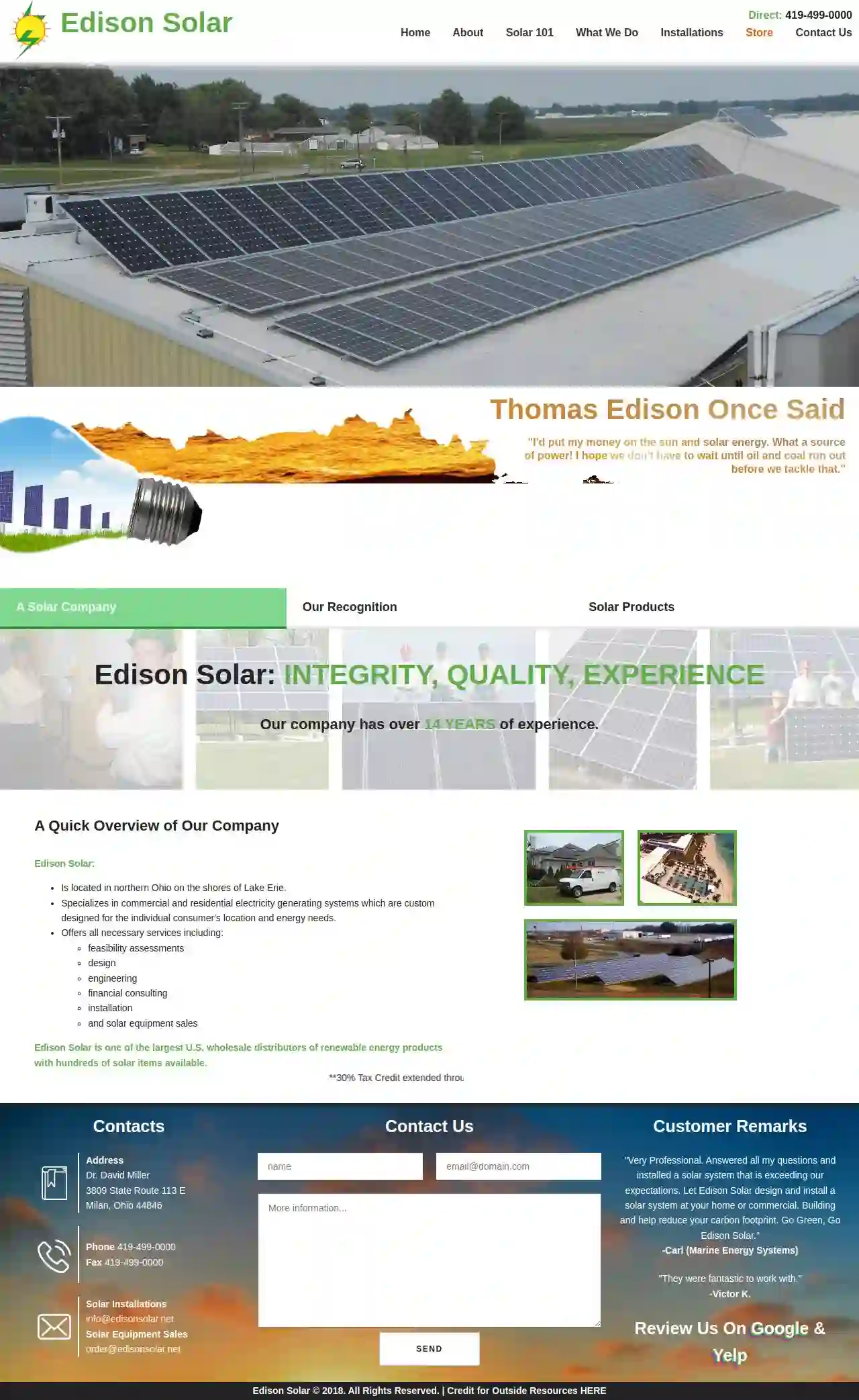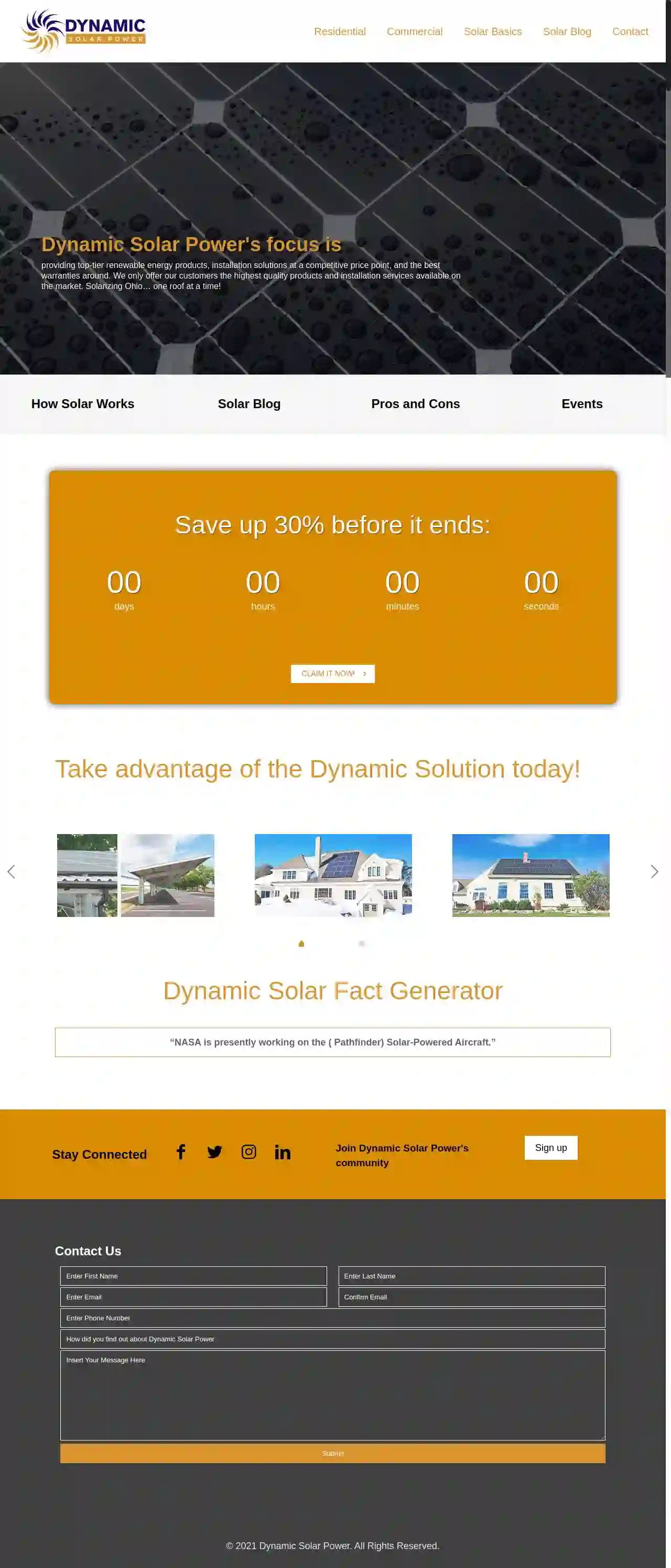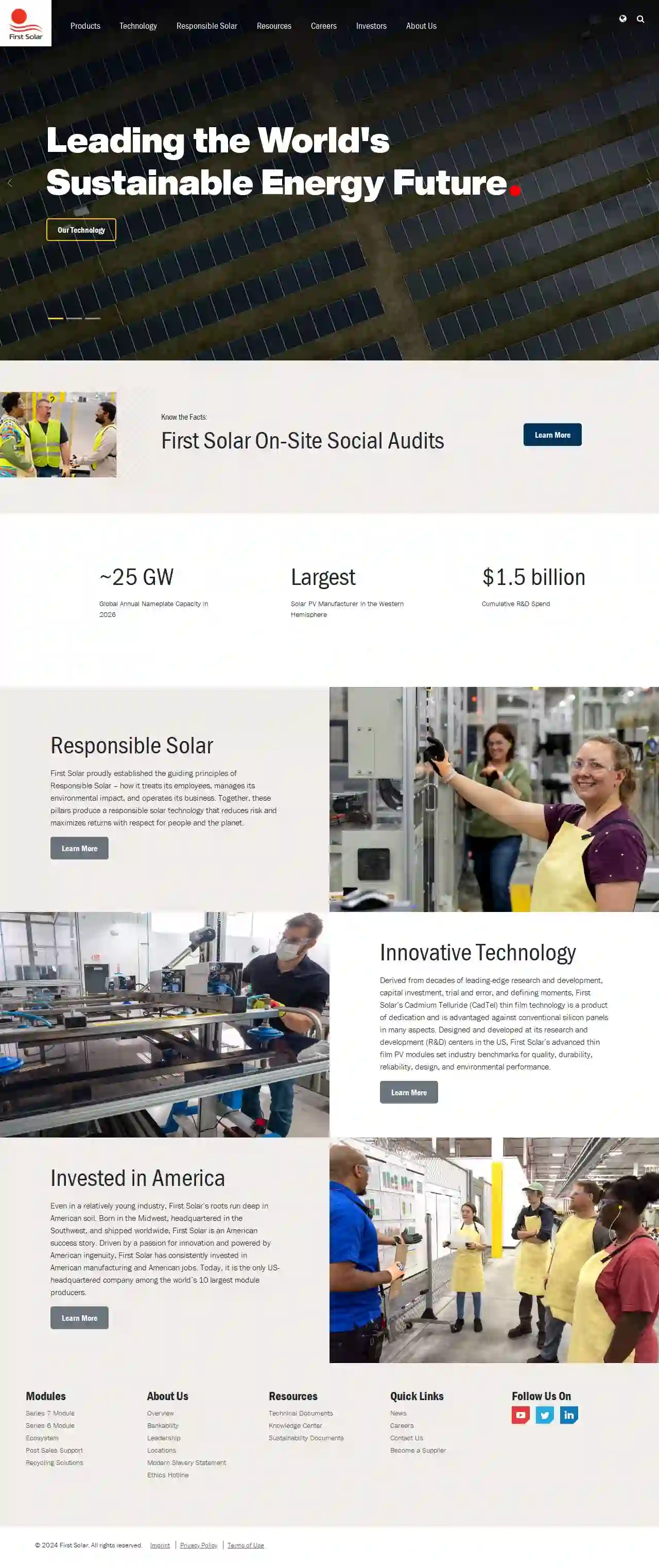Solar Panel Repair & Maintenance Toledo
Top Solar Panel Cleaning in Toledo
Receive up to 3 Solar Panel Repair quotes for your project today! Compare profiles, reviews, accreditations, portfolio, etc... and choose the best offer.

YellowLite
4.7168 reviewsCleveland, Ohio, USA, 1925 St Clair NE Suite #250, 44114, USYellowLite is a premier solar panel installation company that aims to protect the environment by making solar energy more accessible to the masses. Established in 2009, the company has successfully emerged as a leading provider of solar panel services and installations. Their mission is to design and install solar energy systems for both commercial and residential consumers, providing energy independence and solid financial returns.
- Services
- Why Us?
- Accreditations
- Our Team
- Testimonials
- Gallery
Get Quote
Energy Optimizers, USA
4.312 reviewsDayton, Ohio, USA, 632 E. First Street, 45402, USEnergy Optimizers, USA specializes in developing, engineering, and implementing energy efficiency and energy savings projects for educational, governmental, and commercial customers. Our goal is to reduce our clients’ costs while saving the environment.
- Services
- Why Us?
- Accreditations
- Our Team
- Testimonials
- Gallery
Get Quote
Edison Solar, Inc.
4.215 reviews3809 State Route 113 E, Milan, 44846, USEdison Solar is a company located in northern Ohio on the shores of Lake Erie, specializing in commercial and residential electricity generating systems. They offer all necessary services including feasibility assessments, design, engineering, financial consulting, installation, and solar equipment sales. Edison Solar is one of the largest U.S. wholesale distributors of renewable energy products with hundreds of solar items available. They have been in the alternative energy business since 2007 and have developed to the point of having all the essential pieces; panels, racking, inverters, technical and labor to undertake megawatt projects.
- Services
- Why Us?
- Accreditations
- Our Team
- Testimonials
- Gallery
Get Quote
Ohio Solar Connection LLC
4.712 reviews123 Solar Street, Suite 100, Columbus, 12345, USOhio Solar Connection offers best-in-class digital solutions that empower homeowners to design and manage their own solar system without ever leaving home. Their customers feel great knowing they’ve chosen the most efficient and reliable solar backed by an industry-leading warranty.
- Services
- Why Us?
- Accreditations
- Our Team
- Testimonials
- Gallery
Get Quote
Solar Power & Light, LLC.
4.413 reviewsMiamisburg, Ohio, 2411 Crosspointe Dr, 45342, USSolar Power and Light, LLC (SP&L) is an integrated renewable energy company headquartered near Dayton, Ohio. Founded in 2010, SP&L is dedicated to helping clients 'TAKE CHARGE' of their future by cutting costs, hedging risk, and meeting sustainability/energy goals. SP&L offers a range of services including Solar Repair, Monitoring and On-Call Programs, Insurance Claim Re-Installs, and Solar and Battery Upgrades. The company also manages multi-million dollar technology intensive projects and provides O&M, SREC, and PPA Management services for numerous solar fleet owners.
- Services
- Why Us?
- Accreditations
- Our Team
- Testimonials
- Gallery
Get Quote
Sunhub
531 reviewsSunHub HQ, Beverly Hills, 123 Solar Way, 90210, USSunHub is a leading provider of solar energy solutions, dedicated to helping homeowners and businesses harness the power of the sun to save on energy costs and reduce their carbon footprint. With a team of experienced professionals and a commitment to quality and customer satisfaction, SunHub offers a range of services including solar panel installation, maintenance, and repair. Their mission is to make solar energy accessible and affordable for everyone, promoting a cleaner and more sustainable future.
- Services
- Why Us?
- Accreditations
- Our Team
- Testimonials
Get Quote
DYNAMIC SOLAR POWER
51 reviewsColumbus, Ohio, USA, 123 Solar Street, 43215, USDynamic Solar Power focuses on providing top-tier renewable energy products, installation solutions at a competitive price point, and the best warranties around. We only offer our customers the highest quality products and installation services available on the market. Solarizing Ohio… one roof at a time!
- Services
- Why Us?
- Accreditations
- Our Team
- Testimonials
- Gallery
Get Quote
Exel Solar
421 W State St Suite 243, Columbus, Ohio, 43215, USExel Solar specializes in wholesale solar distribution, aiming to accelerate the shift towards clean and sustainable energy. Our mission is to provide comprehensive solar project services encompassing engineering, procurement, marketing, and logistics.
- Services
- Why Us?
- Accreditations
- Our Team
- Testimonials
- Gallery
Get Quote
Ohio Power Solutions, LLC
547 reviews123 Main St, Suite 100, Columbus, 43001, USOhio Power Solutions is a family-owned and operated company based in Columbus, Ohio, that specializes in providing renewable energy solutions to local communities. They offer a range of services including solar installation, solar thermal, wind power, lighting, and generator installation. With 13 years of experience and a team of licensed and insured professionals, Ohio Power Solutions aims to help residential, agricultural, and commercial communities invest in sustainable energy technology.
- Services
- Why Us?
- Accreditations
- Our Team
- Testimonials
- Gallery
Get Quote
First Solar
441 reviews350 W Washington St, Suite 600, Phoenix, 85004, USFirst Solar is a leading American solar technology company and global provider of responsibly produced, eco-efficient solar modules advancing the fight against climate change. The company is dedicated to innovation, sustainability, and responsible solar technology, with a strong commitment to environmental and social responsibility.
- Services
- Why Us?
- Accreditations
- Our Team
- Testimonials
- Gallery
Get Quote
Over 4,210+ Solar Installers registered
Our solar pros operate in Toledo and surrounding areas!
SolarCompaniesHub has curated and vetted the Best Solar Installers near Toledo. Find the most reliable pro today.
Solar Panel Repair & Maintenance FAQ
- Use a Directory Like SolarCompaniesHub: We connect you with pre-screened solar repair specialists in your area.
- Check Online Reviews: Look for positive reviews on Google, Yelp, and other reputable platforms.
- Ask for Referrals: Get recommendations from friends, family, or neighbors who have had solar panel repairs done.
- Verify Credentials: Ensure the company is licensed, insured, and certified by relevant industry organizations.
- Get Multiple Quotes: Compare quotes from several companies, considering price, experience, and warranty information.
- Ask Questions: Don't hesitate to ask about their experience with similar repairs, their process, and their warranties.
- Choosing impact-resistant solar panels: Some manufacturers offer panels specifically designed for enhanced hail resistance.
- Protecting your panels during hailstorms: If a hailstorm is forecast, consider covering your panels with a protective barrier, such as a tarp or plywood, if feasible.
- Inspecting panels after a hailstorm: After a hailstorm, carefully inspect your panels for any signs of damage.
- Microinverters or Power Optimizers: These devices can mitigate the effects of shading by optimizing the output of each individual panel.
- Strategic Panel Placement: A qualified installer will assess your roof and design a system layout that minimizes potential shading from trees, buildings, or other obstructions.
- Choose a Cool, Overcast Day: Avoid cleaning panels in direct sunlight or when they are hot, as the cleaning solution can dry too quickly and leave streaks.
- Use a Soft Brush or Sponge: Avoid abrasive materials that could scratch the panels. A soft-bristled brush or a non-abrasive sponge is ideal.
- Use Mild Soap and Water: A gentle cleaning solution of mild soap (dish soap) and water is usually sufficient. Avoid using harsh chemicals or detergents.
- Rinse Thoroughly: Rinse the panels thoroughly with clean water to remove any soap residue.
- Safety First: Be careful when working on your roof. Use a sturdy ladder and consider wearing a safety harness. If you are uncomfortable working on your roof, it's best to hire a professional.
How do I find a reputable solar panel repair company?
Can solar panels be damaged by hail?
How does shading affect solar panel efficiency?
Can I clean my solar panels myself?
How do I find a reputable solar panel repair company?
- Use a Directory Like SolarCompaniesHub: We connect you with pre-screened solar repair specialists in your area.
- Check Online Reviews: Look for positive reviews on Google, Yelp, and other reputable platforms.
- Ask for Referrals: Get recommendations from friends, family, or neighbors who have had solar panel repairs done.
- Verify Credentials: Ensure the company is licensed, insured, and certified by relevant industry organizations.
- Get Multiple Quotes: Compare quotes from several companies, considering price, experience, and warranty information.
- Ask Questions: Don't hesitate to ask about their experience with similar repairs, their process, and their warranties.
Can solar panels be damaged by hail?
- Choosing impact-resistant solar panels: Some manufacturers offer panels specifically designed for enhanced hail resistance.
- Protecting your panels during hailstorms: If a hailstorm is forecast, consider covering your panels with a protective barrier, such as a tarp or plywood, if feasible.
- Inspecting panels after a hailstorm: After a hailstorm, carefully inspect your panels for any signs of damage.
How does shading affect solar panel efficiency?
- Microinverters or Power Optimizers: These devices can mitigate the effects of shading by optimizing the output of each individual panel.
- Strategic Panel Placement: A qualified installer will assess your roof and design a system layout that minimizes potential shading from trees, buildings, or other obstructions.
Can I clean my solar panels myself?
- Choose a Cool, Overcast Day: Avoid cleaning panels in direct sunlight or when they are hot, as the cleaning solution can dry too quickly and leave streaks.
- Use a Soft Brush or Sponge: Avoid abrasive materials that could scratch the panels. A soft-bristled brush or a non-abrasive sponge is ideal.
- Use Mild Soap and Water: A gentle cleaning solution of mild soap (dish soap) and water is usually sufficient. Avoid using harsh chemicals or detergents.
- Rinse Thoroughly: Rinse the panels thoroughly with clean water to remove any soap residue.
- Safety First: Be careful when working on your roof. Use a sturdy ladder and consider wearing a safety harness. If you are uncomfortable working on your roof, it's best to hire a professional.